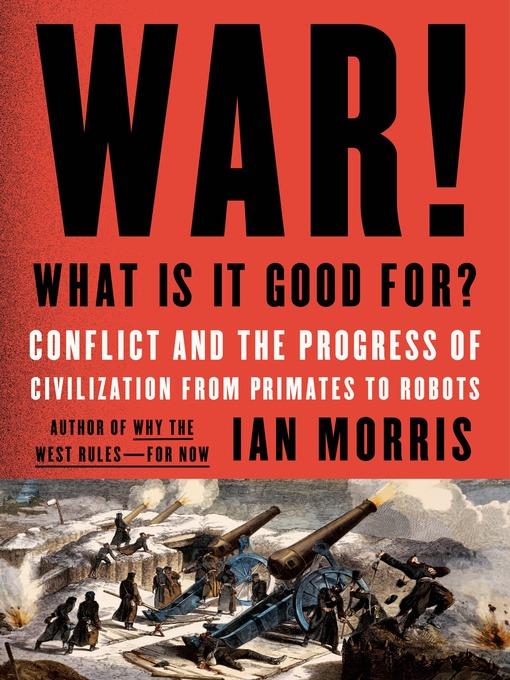
War! What Is It Good For?
Conflict and the Progress of Civilization from Primates to Robots
کتاب های مرتبط
- اطلاعات
- نقد و بررسی
- دیدگاه کاربران
نقد و بررسی

January 20, 2014
Big thinker Morris (Why the West Rules—for Now) returns with an ambitious, epoch-spanning study of violence writ large across time and place. The author posits the counterintuitive and controversial view that war has made the world safer and richer over the long run. As humanity evolved biologically and culturally, he argues, it learned that imperious Leviathans were necessary to cage the violent beast within; these ruling powers “in turn created bigger societies, pacified them internally, and allowed economies to grow.” Dominant polities then became superpowers or “globocops that keep the peace by raising the costs of breaching it to prohibitive levels.” By surveying germane, timely issues from containment to ICBMs and “doomsday devices,” as well as speculating on the potentials of the transhuman and posthuman, Morris casts a wide net. But in oscillating between doom-and-gloom predictions and sunnier scenarios, he leaves little room for nuanced eventualities. His overconfidence in computerization and technology as the ultimate means of obviating the need for waging megawar elides the human variable in his calculus. Still, this is a fascinating and stimulating work sure to compel readers of anthropology, archaeology, history, and futurity. Illus. Agent: Sandra Dijkstra, Sandra Dijkstra Literary.

Starred review from February 15, 2014
A profoundly uncomfortable but provocative argument that "productive war" promotes greater safety, a decrease in violence and economic growth. Morris (Classics and History/ Stanford Univ.; Why the West Rules--for Now: The Patterns of History, and What They Reveal About the Future, 2010, etc.) begins with an account of a near nuclear disaster in 1983 and then proceeds with his thesis that "war has made the world safer." He recognizes--and alludes continually to--the unpleasantness of his position but charges ahead into the valley of death. He uses the example of ancient Rome--its violent conquests ensured subsequent safety and improved lives for the survivors--then gives us a tour through world history, focusing on such things as the development of weapons and defenses. We learn why chariot fighting rose and fell, the problems of using elephants in battle, the significance of the horse, and the importance of gunpowder and ships, and we get some grim details--e.g., the use of the flaming fat of victims as an early Molotov cocktail. Drawing on the work of Jared Diamond and Steven Pinker and myriads of others, Morris relentlessly develops his thesis, which never decreases in discomfort, though it does become more convincing. Near the end, the author examines evolutionary biology and the balance between violence and cooperation in our rise from what he calls "globs" to the complicated creatures that we now are. Emerging also is his concept of the "globocop"--a country so powerful that it can police the world (to a point) and eventually move us toward "Denmark," his metaphor for a peaceful, productive place. The author does a bit of crystal-balling at the end. Will there be robo-wars? Will the United States eventually tumble? A disturbing, transformative text that veers toward essential reading.
COPYRIGHT(2014) Kirkus Reviews, ALL RIGHTS RESERVED.

Starred review from March 1, 2014
This erudite yet compulsively readable history of war (and actually much more) by archaeologist-historian Morris (Why the West RulesFor Now, 2010) takes the provocative position that, over time, the value of war, despite its horrors, has been to make humanity both safer and richer. He covers a vast span, from primitive (Morris enlists anthropological studies of chimpanzees and early protohumans to explain aggression) and ancient civilizations to the American Empire. War's impact in terms of lives lost (as a percentage of national population) has lessened, Morris demonstrates, and its long-term effects have been, as he puts it, productive. The thesis is elegantly advanced (there is something to marvel over or even chuckle about on almost every page). Morris is as comfortable referencing Edwin Starr, who sang the song from which the title derives, as he is Thomas Hobbes. Only large centralized states, Hobbes' Leviathans, forged by war, can secure stability. Simply put, War made the state, and the state made peace. Throughout this rare mixture of scholarship, stunning insight, and wit, Morris cites the widely divergent opinions of past philosophers and scholars, and, though he makes his case convincingly, future (and, oh yes, the future is projected) students, readers, and critics of this book are likely to continue the fascinating argument Morris raises here. War! What Is it Good For? appeals to (indeed, may broaden) the large audience that has made Jared Diamond's Guns, Germs, and Steel (1997), much quoted in it, a modern classic and should join it on personal and library bookshelves.(Reprinted with permission of Booklist, copyright 2014, American Library Association.)

November 1, 2013
In the Stone Age, people had as much as a 1-in-5 chance of dying violently, while the rate was 1-in-100 in the presumably bloody 20th century. Why? Says Stanford professor Morris, war means more complex societies that squelch internal violence. Discuss.
Copyright 2013 Library Journal, LLC Used with permission.

























دیدگاه کاربران